Emperor: Rise of the Middle Kingdom Preview
Ring in the Chinese New Year with an exclusive preview of the latest City Building game from Impressions and BreakAway.
It's hard to believe that it's been nearly 10 years since Impressions released Caesar, the first in what would become a long line of well-respected city-building strategy games. Since then, the company's City Building Series has been bolstered by two more Caesar games, a pair of Pharaoh games, and most recently, Zeus and its subsequent expansion pack, Poseidon. But while the evolution of these games has been shaped by a full decade's worth of advances in gameplay innovations and graphics technology, the entire series has been defined, up until now, by two constants: They all take place in the Mediterranean, and they all lack any form of multiplayer support. That's all about to change later this year when Sierra releases the latest entry in the City Building Series, called Emperor: Rise of the Middle Kingdom.
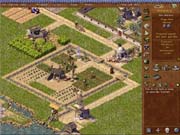
The two most important things that you should know about Emperor is that it takes place in China and that it'll be the first City Building game to have multiplayer support. And there's actually a third thing to take note of: It's not being developed by Impressions at all. Maryland-based BreakAway Games has that particular distinction. If you recall, BreakAway developed Cleopatra, the expansion pack to Impressions' Pharaoh, as well as the excellent add-on to Tropico, Paradise Island. According to Impressions producer Jon Payne (who, surprisingly, has no relation to Max Payne), BreakAway was the obvious choice for Emperor's developer. "We have a great relationship with those guys," says Payne. "We're currently busy working on Lords of the Realm III, so we approached BreakAway with the idea to do this game." The idea to create Emperor was conceived at Impressions in late 2000, shortly after the release of Zeus, and BreakAway began actively coding the game with a full development staff in April 2001. Since then, production on Emperor has been moving along at full steam, but publisher Sierra kept news of the game's development quiet, waiting for the right time to reveal its hand. Well, what better time to unveil a game set in China than on the dawn of Chinese New Year? To commemorate this event, we recently had the opportunity to talk to Payne about Emperor, and even though the game is still almost a year away from completion, we learned some new details about what's clearly shaping up to be yet another promising City Building strategy game.
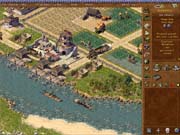
For the most part, Emperor will follow in the footsteps of all of Impressions' previous city-building games in that it'll blend some elements of urban management with a bit of real-time combat--in a package that isn't intimidating to the casual player and yet still compelling to the more serious closet mayor. Your overall goal of successfully building and managing a sprawling urban area remains unchanged from the goals of earlier games. That means you'll be in charge of all aspects of city life, from deciding how much to tax your populace to ensuring a successful crop and even maintaining a sizable military force to repel invasions. Naturally, Emperor will also have the notion of diplomacy. China is a vast country with many towns and regions, so you'll have to contend with your neighbors by participating in diplomatic relations and trade or choose the slightly less pleasant approach of engaging in open hostilities or spying. In fact, there will be several levels of diplomatic relations between your city-state and your neighbors. "The inclusion of emissaries and spies lets us give Emperor a level of diplomatic interaction that we weren't able to achieve in Zeus and Pharaoh," explains Payne. "For instance, if one of your spies is caught operating in a foreign land, and your diplomatic ties with that empire were already bad, then war will break out between you two." However, anyone who's played any of the earlier Impressions games knows that combat is secondary to the other gameplay elements of the series--the combat has always been somewhat an afterthought in the City Building Series. Payne asserts that Impressions and BreakAway are working very hard at making combat easier to control in Emperor. Specifically, the idea of conscription from Zeus is now gone, which means that your citizens won't neglect their daily chores whenever they're called to arms, and the addition of siege engines and other war machines should facilitate invasions. Of course, there will also be the option to let the computer handle combat altogether, and that too is being improved upon.
What's New
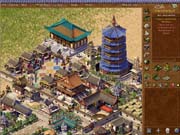
In developing Emperor: Rise of the Middle Kingdom, Impressions and BreakAway had a handful of ideas that they wanted to implement, most of which were either generated by fan feedback or learned from the lessons of previous games in the series. Highest on their list was an enhanced graphics engine, and the quickest way to give Emperor's visuals a boost was to up the default resolution from 800x600 in Zeus to the new standard of 1024x768. Doing so has allowed the designers to increase the viewing window of the game, which will ultimately make it easier to judge your city's progress at a glance and to better keep track of all the happenings involved in its management. BreakAway is going one step further and is enlarging the standard grid size for each square plot of land. Basically, this will add more pixels per square inch for a populace that will look a lot more detailed than it ever has in any of the previous City Building games. All this increase in visual performance will give the company's artists the ability to showcase their talents by adding a number of subtle but relevant visual niceties throughout the game. According to Payne, you'll be able to make out birds fluttering among thick forests, revelers celebrating the New Year in the streets, and shopkeepers hocking their wares to passersby. And as you can tell from these screenshots, the level of detail in Emperor has already reached a point where it becomes easy to see the individual tiles on the roof of a massive pagoda or an ancient temple.
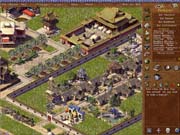
But changes to the City Building formula aren't limited to just the graphics engine. The concept of building grand monuments is one that Impressions strayed away from in Zeus, and BreakAway intends to reimplement that gameplay aspect. Payne explains: "With Emperor, we're taking the series back to the more traditional roots of Pharaoh. I think people really enjoyed the detailed level of micromanagement that [that specific game] gave them over their city. So we're adding tons of options that'll let our users fiddle with all aspects of city life, and we'll be returning the notion of building grand monuments like the Grand Canal, pagodas, ancient emperor tombs, Su Sung's clock, and the Great Wall of China." Unlike the sanctuaries in Zeus, these monuments will serve as objectives for the successful completion of a given mission, much the same way they worked in Pharaoh. The final number of monuments is still in flux, but it's safe to assume that all will have both an aesthetic and a functional value--these ancient landmarks will draw crowds and eventually increase your population, allowing you to generate more income from taxation.
Another new element specific to this game is the advancement of eras. Emperor will take place in 2100 B.C. and extend through A.D. 1300, covering a full three and a half millenia of China's history. That's a long span of time, so you can expect the technologies that you use to build and maintain your empire to change throughout the course of the game. This feature is unique to this series of games, though it's been quite prominently featured in Age of Empires and Empire Earth. It's markedly simpler in Emperor, however. You simply won't have access to certain industries like farming techniques or weapons like steel blades until the later eras in the game. Specifically, there will be a total of 12 specific eras in Emperor, five of which have truly unique representations of how life was like from an agricultural and industrial standpoint in China. "These aren't like the Age [of Empires] upgrades," notes Payne. "You don't hit the 'upgrade' button within a mission...as you go through the game, you'll enter a new era after completing a specific map." And as with the other City Building games, you can expect to find many of the missions and campaigns modeled after specific historical events.
The Year of the Horse
In addition to referencing Chinese history, Emperor: Rise of the Middle Kingdom will incorporate several aspects of China's culture. The concept of Feng Shui, which is the philosophy of creating ergonomic and efficient surroundings as accorded by the laws of nature, is one such culture that will affect the way that you play Emperor. Feng Shui is typically associated with interior decoration, but in the game, the concept has to be taken into consideration when designing your entire city. Payne elaborates: "Chinese cities are very crowded, and people often build homes quite literally on top of each other. Because of this, many of their cities are designed to house specific functions in different parts, and these different areas are often separated by walls. When you finish a particular campaign in Emperor, you'll get scored on several scales, including a cultural rating and a financial rating. One of these scores is a Feng Shui rating, and it's determined by how efficiently how you planned out the design of your city." To better assist you in creating this vision of efficiency, Emperor will include structural items like walls, which will keep residential areas separate from industrial ones, as well as roadblocks that limit foot traffic to certain areas.
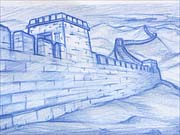
The Chinese zodiac is another idea that is deeply rooted in the Chinese culture and is echoed throughout everyday life. It too will play an important part in Emperor. When you play Emperor for the first time, the game will ask you for your date of birth, and depending upon what your Chinese zodiac is, you'll receive a bonus that relates to that specific animal. For example, if you were born in 1980, your zodiac is the monkey, which relates to water. So when the next year of the monkey rolls around in 2004, you'll get a bonus for sea borne trade for that entire year, and when the year expires, you'll lose that bonus. Since some of the Chinese zodiacs will be out of rotation for five more years, though, we expect that Emperor will grant players' specific zodiac bonuses all the time instead of waiting for their respective year to roll around.
Without a doubt, though, the biggest difference between Emperor and its predecessors is the inclusion of a multiplayer component. But even though Impressions and BreakAway are excited about such a big step for the City Building Series, the developers are understandably wary about tinkering with a sure thing. "These games, first and foremost, have always been single-player games," says Payne. "That in and of itself has generated a huge fan base for us, and we don't want to upset our fans by messing with our tried-and-true formula. With the multiplayer element of Emperor, we want to add a bonus to the game's core single-player gameplay without detracting from it." According to Payne, multiplayer games in Emperor will be a slight reflection of the single-player campaigns and won't have completely new modes of play. That's because BreakAway and Impressions don't want to break the single-player formula to accommodate a multiplayer component. But that doesn't mean that multiplayer games will be something as simple as a race to see which player can build the largest city. "It's more subtle than that," explains Payne. "Users can play cooperatively or against each other, but elements of diplomacy, trade, and spycraft will always play into each match." Payne also says that the developers aren't concerned with focusing on multiplayer battles either, since companies such as Westwood, Blizzard, Ensemble, and Stainless Steel pretty much have that market cornered. Instead, gameplay will largely rotate around city management, although there will be numerous parameters and victory conditions that you'll be able to set before each match.
The quality of Impressions' City Building Series certainly speaks for itself. Fans have been enjoying their unique style of lighthearted urban management for nearly 10 years, or, should we say, to keep in the spirit of the season, since the last year of the rooster. Even in its early stages, Emperor: Rise of the Middle Kingdom promises to be yet another great addition to the long-running series. The game is currently scheduled to ship in late fall of this year, and we'll have more detailed impressions of it as its release date approaches.
Got a news tip or want to contact us directly? Email news@gamespot.com
Join the conversation